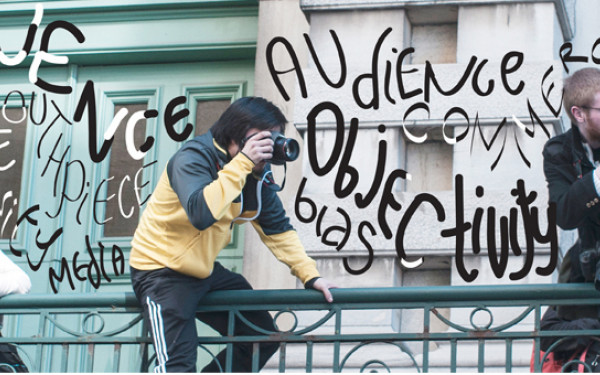Searching for that Golden Internship
The plight of the unpaid intern has been well-documented, having to fight for measly, unpaid hours to get some all-important exposure. From finance to fashion, the ubiquitous “non-remunerated position” (a nice way of saying “we’ll pay you in coffee and experience”) has been spotted even for luxury hotel busboy positions.
In the field of journalism, which is seeing both massive cuts by major players and a proliferation of startups, the quest for a good internship means sifting through reams of dubious ones.
Internships are encouraged but not required in Concordia’s journalism department. Postings are passed along to students if they seem to have some journalistic merit.
“I always look through the emails, but most of the time it’s for a bad joke, more than an opportunity,” said second-year journalism student Matthew Guité. “Nine times out of 10 they’re not worth the time.”
It’s a problem the department is well aware of.
“I’ve tried this year to really reduce the amount coming the students’ way,” said Brian Gabrial, chair of Concordia’s journalism department. “Because they’re not filtering through it, [or] they’re just ignoring it.”
Gabrial says the amount of paid internships has decreased, but notes there were never many to begin with. What students can get out of these jobs, in lieu of money, are contacts and real-world experience.
“They’re usually unpaid, and I have a hard time sometimes justifying sending a student off to do an eight-week or 12-week internship with no pay,” said Gabrial. “But I think that’s the name of the game with a lot of places.”
Desiree Hostettler is tasked with sifting through these requests for free labour for the department. As a journalism graduate student, she has a contract to spend 10 hours a week helping connect students with prospective work.
For requests from recognized media that the department has worked with before, this simply means forwarding the message along to students.
“Others like online blogs or startup magazines are sometimes a bit sketchier, so we research them,” said Hostettler. “Does their website look professional enough? Would our students be possibly interested in these internships?”
She said that students can also contact her for advice on the quality of an internship they are considering, or if there’s a specific type of job they’re looking for. However, she believes a full-time position is needed to better answer requests from students for the most popular postings.
Guité was trained at CJAD during a two-week unpaid internship, which he says was the ideal fit for him and has led to employment at the station as a part-time show producer and technical operator.
One problem he sees with most opportunities passed along is having to move to a different city—often Toronto but as far as London, England for one CBC internship sent to students by the department—for weeks or months of unpaid work.
For Guité, doing free work for “really small content creators that aren’t well known that aren’t going to be a draw on your CV” is not a trade-off he’s willing to make.
“That might fly for the CBC because going to London to work for them might be the opportunity of a lifetime for a student that can afford it, but for most [internship postings] having them on your CV isn’t going to do a lot,” he said.
An unpaid job in one of the most expensive cities in the world obviously excludes some from applying, but Gabrial points out the experience is valuable for those who can afford it. Students who get the CBC London job are also able to apply for a scholarship through the department to help cover costs.
“Back in the day, I couldn’t have afforded to go to London for six weeks,” said Gabrial. “But on the other hand those students [that did go to London] have come back and are working now. It’s not like there wasn’t a payoff for that.”
Gabrial personally forwards along internships that will get students work in journalism. However, other opportunities that may interest students are passed along as well. This includes a two-week internship at The American Pavillion, a “hospitality and communications hub” at the Cannes Film Festival, according to its website.
The job came with a $3,000 price tag, plus travel costs.
A representative from the company gave a presentation ahead of last year’s festival in the basement of Concordia’s Communications and Journalism Building. The event was booked by the communications department and forwarded to journalism students.
“He tells you that if you’re accepted into the program how privileged you are […] they make you feel very special to be chosen, that Leonardo DiCaprio has the same badge as you,” said Alexandra Giubelli, a Concordia journalism student who was selected as an intern at last year’s festival.
“They make it seem like the chance of a lifetime.”
Giubelli says she was told she would be able to network at the festival, and could potentially work for the Hollywood Reporter. However, she said that it later felt “like once you paid them you were left to your own devices.”
As one of about 150 interns working the pavillion, unable to hand out business cards during her 7 a.m. to 11 p.m. shifts, she enjoyed the glamour but questions how useful the job was for her career.
“We assumed when they would look at the brochures if it’s the Cannes film festival, there’s probably not going to be a lot of journalism involved there,” said Gabrial, adding such an opportunity could offer exposure to an aspiring film critic.
“[With] that kind of internship you’re just going for the name and the recognition of the organization that’s sponsoring it, and students have to be cautious when they look at that,” he said.
Giubelli does not blame the department for passing along these job postings, but believes some follow-up should be done to see if it’s worth sending to students again the next year.
“At some point there is a need to take things a step further,” said Giubelli. “But maybe they should ask, was it worth it? Is it worth sending this to our students?”
Concordia is working to offer more paid opportunities to its students. The journalism department’s co-op program began this semester, where first-year students are offered paid media work based on academic merit.
However, given the industry norm of unpaid work, attracting partner companies has not been easy.
“We’re having trouble getting news operations to be part of the co-op. Most of them know they could get a student for six weeks without paying them,” said Gabrial.
Undergrads can also submit a proposal to the department to work 160 hours at a media company for credit. If the job pays, however, it is ineligible for credit. It’s a policy Gabrial says isn’t going anywhere—likening the situation to how college athletes do not get paid.
“At first I was observing and shadowing, but the more you show initiative the more you get to do,” said Joel Ashak, who worked at Radio-Canada last semester for credit. “I got a job out of it, so I was one of the lucky ones.”
Ashak now works on the production side, getting clips together for newscasts. But his aim is to be in front of the camera once he completes his degree at Concordia.
He stresses the impact working under real pressure can have on young journalists.
“When you write articles for school, you don’t put your mind into it as much as if it was published,” said Ashak. “You work way more seriously when you know people will be reading your article.”







